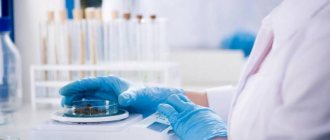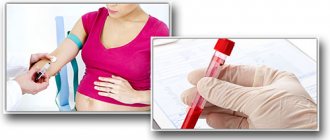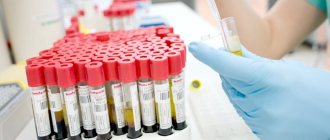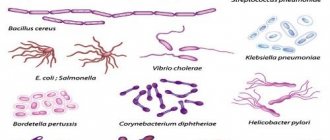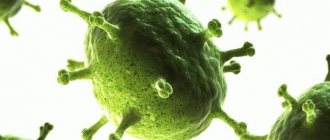If roundworms live in the human body for a long time, a disease called ascariasis begins, which is dangerous for its complications, since the worms can penetrate various organs, damaging them.
To make an accurate diagnosis, it is important to undergo an examination, in particular, take a blood test for roundworms, the decoding of which will help determine the presence of worms in the body.
Causes of infection with ascariasis
During their life, parasites release toxic substances, which harm the body.
Adult roundworms can injure the walls of the small intestine, causing a local inflammatory effect and even perforation. If ascariasis is in an advanced form, the worms form a ball that can clog the intestinal lumen, which leads to acute intestinal obstruction. Ascariasis often causes acute appendicitis, peritonitis and purulent abscesses.
Roundworms
You can become infected with roundworms as a result of drinking poor-quality water or poorly washed vegetables and fruits. Parasite eggs are also found on the surface of some objects: banknotes, in public places on handrails and handles.
Infection also often occurs through contact with pets. Once in the body, parasites affect many organs: lungs, liver, intestines. Adult parasites most often reside in the large intestine.
Which analysis is the most accurate?
It is impossible to single out a specific analysis as the most accurate. Based on one analysis, doctors never draw specific conclusions.
To accurately determine whether the parasite is present in the body, a comprehensive examination is always carried out.
Sometimes a stool analysis may indicate that parasites are completely absent, while the presence of antibodies to worms in the blood 100% confirms the diagnosis.
What are antibodies to roundworms?
Antibodies to roundworms are an indicator of human infection with helminths of the species Ascaris lumbricoides, which parasitize the small intestine. Immunological diagnostics, which determine the presence of antibodies to roundworm antigens in the patient’s blood serum, can detect the disease in its early stages.
When is analysis necessary?
The initial (migration) stage of the disease lasts up to three months; it is during this period that the analysis is informative. Antibodies to roundworms of the IgG class begin to be produced in the human body 2-3 weeks after infection, reaching their maximum after 2-3 months. By conducting research, you can avoid further development of the disease and its transition to the chronic stage. The analysis is shown:
- with difficult diagnosis;
- when examining carriers;
- to monitor prescribed therapy;
- during preventive measures.
If a person’s general blood test shows high leukocytosis of unknown etymology, then the doctor prescribes a test for antibodies to helminths.
Poor health: dry cough, shortness of breath, decreased immunity, temperature fluctuations, poor sleep, muscle pain - can be caused by helminthic infestation. If infection is detected, then during treatment you will have to donate blood for antibodies several times in order to track the dynamics of the development of the disease. The method is widely used during routine preventive examinations in children's institutions and public catering, since it allows identifying carriers at an early stage.
Enzyme-linked immunosorbent assay (ELISA)
When conducting a laboratory analysis, ascariasis (Ascaris lumbricoides) antigens of the required concentration are placed in the wells of a medical tablet, then the patient’s blood serum is added.
If it contains antibodies to roundworms, then they bind to the antigens located in the tablet. These compounds are identified by an enzyme reagent that is specifically included in such compounds. At the end of the study, a colorless substrate is added to the wells, which reacts with the contents and affects the color of the material being tested.
The intensity of the resulting color depends on the number of interconnected antigens and antibodies. The number of pairs formed is calculated visually or using spectral analysis. The diagnostic accuracy of this method is 95%. A test for antibodies to roundworm antigens in combination with clinical blood tests and information about the treatment is comprehensive and allows you to prescribe the correct therapy.
Conduct and results of analysis
To conduct the study, blood is taken from a vein. In order for the analysis to be as accurate as possible, it is taken on an empty stomach. The last meal should be no later than 8 hours, and you can drink water. One day before, you need to stop eating fatty and fried foods, eliminate alcohol and physical activity, and, if possible, stop taking medications. If it is not possible to cancel them, then you should inform the laboratory assistant about the medications you are taking in order to exclude an incorrect result, which can be of three types:
- positive;
- negative;
- borderline.
Positive (titer greater than 1/100) means infection with roundworms in the initial stage or a previous illness. The analysis displays a quantitative positivity rate, which, when viewed over time, will help adjust the treatment process. Occasionally, false positive tests may result due to cross-response immunological responses. This is due to the content of identical antigenic components characteristic of different types of helminthiasis: trichinosis, toxocariasis, opisthorchiasis and others. If positive results are obtained, an examination of all family members is scheduled.
Negative (titer less than 1/100) may reflect the lack of invasion, as well as an unattained level of detection of IgG antibodies to roundworms. This is possible if the immune reaction is weak and if the infection is too early or too late.
A questionable result indicates the presence of a certain amount of specific antibodies, close to the borderline level, and the detection of an overlap of other indicators in the blood. In this case, the test for specific antibodies to roundworms should be taken again after 2 weeks. Repeated questionable analysis is considered negative.
The result is ready on the 3rd day, not counting the day of blood sampling. Having received a transcript of the examination, the infectious disease doctor will prescribe adequate treatment that will allow you to forget about ascariasis forever.
FAQ
Since the test is quite expensive, patients have many questions regarding the need for it, effectiveness and other issues.
Below we provide a list of questions with answers to them:
- Is this analysis a scam? This study allows you to obtain reliable results in the first month of infection. In chronic cases, immunodeficiency states, and blood tests in newborns, antibodies can be difficult to detect.
- Which research method is the most accurate? The answer to this question is directly related to the stage of the disease. In any case, a comprehensive study is carried out.
- Are there false results? The error of the results is only 10 percent. The accuracy of the IgG antibody test is 94%. If the results are questionable, clarification is carried out; for this purpose, the blood test is repeated after a month.
- Sometimes patients are interested in the answer to a question regarding the disease itself, in particular, can the disease not produce symptoms? Indeed, with minor invasion and at an early stage, the disease is sometimes asymptomatic.
An advanced disease can cause pathologies of the gastrointestinal tract, allergic reactions, intestinal obstruction, obstructive jaundice, pneumonia, pancreatitis and appendicitis. This is why timely diagnosis and treatment are so important to help avoid dangerous complications.
Which analysis is more accurate?
If the primary diagnosis calls into question ascariasis, then the study should be comprehensive, since in different cycles of ascaris development, they can be detected using fundamentally different methods.
What is the probability of error when testing for ascariasis?
A positive or negative result in the acute stage of development gives an error of only 10%. Moreover, the accuracy of determining individual antibodies, for example, IgG to roundworms, is at least 94%. Questionable analyzes are subject to clarification. Approximately a month after the first study, repeated results are analyzed over time, and if the titer decreases or increases, respectively, a negative or positive conclusion is given.
Can ascariasis be asymptomatic?
At the early stage of the roundworm's life cycle, in particular when migrating throughout the body, especially with minor damage, ascariasis is practically asymptomatic.
Ascariasis causes various pathologies: from gastrointestinal to temporary organs and allergic reactions. Invasion can cause intestinal obstruction, pneumonia, obstructive jaundice, pancreatitis, and appendicitis. Therefore, diagnosis and correct interpretation of results is so important at all stages of ascariasis.
Preventive measures
Unfortunately, cases of re-infection with roundworms are not uncommon, so experts advise periodically preventing the disease, as well as adhering to basic rules of personal hygiene:
- Most often, infection with roundworms occurs in places of mass gatherings, especially in schools and kindergartens, where, due to their age, children often neglect the rules of hygiene. Therefore, preventive tests for the presence of helminths are often carried out in these institutions;
- general rules of hygiene: washing hands before eating, after visiting the toilet, wash with soap and warm water; all fruits and vegetables are thoroughly washed with warm water before consumption;
- if there is frequent infection with parasites in the area where a person lives, then it is better to periodically take anti-helminth medications for preventive purposes;
- Frequently ventilate the premises in which you live, do wet cleaning of the floor, it is better to use various disinfectants.
But the most important thing when infected with roundworms is diagnosis in the early stages of the disease. As mentioned above, ascariasis is dangerous due to the occurrence of various complications. Only early diagnosis, proper treatment and compliance with preventive measures can protect a person from possible complications and prevent re-infection with these helminths.
The life cycle of roundworm: how it affects the choice of research method
The life cycle of roundworm: how it affects the choice of research method
Even if one analysis gave a negative interpretation, it is impossible to say for sure that there is no disease. The stage of the disease is always taken into account. If this is the migratory phase, when roundworm larvae enter the lungs, then come out with sputum, end up in the mouth and again in the intestines, special studies are needed. At this time, X-rays (and several procedures), ultrasound, computed tomography, and endoscopy are needed. The doctor decides what exactly will be prescribed. For example, an x-ray reveals infiltrates in the lungs - inflamed areas affected by helminth larvae.
The intestinal stage is the easiest to study. A stool analysis will be informative. But to clarify, the doctor will also perform a blood test. Ultrasound and x-rays are also possible at this stage of the disease - they will allow you to see where the parasite is currently localized.
Therefore, the patient can be prepared for the fact that a blood test for ascariasis is not the only procedure that he will have to undergo.
About the disease
There are several types of roundworms that can live in the human body, but most of them are obligate (obligatory) for animals, and do not reach sexual maturity in the human body.
The exception is Ascaris lumbricoides - the human roundworm; it goes through all stages of its development cycle in the body of the final host, causing significant harm to its health. The female of this helminth is capable of growing up to half a meter in length, significantly exceeding the size of the male. She can lay two hundred or more eggs per day.
Ascaris eggs enter a person's mouth with unwashed vegetables or berries from the garden, raw water, and dirty hands. The helminth lives for about a year, going through 2 main stages in its life cycle:
- Larval period - in the small intestine of a person, larvae hatch from eggs, which drill a passage for themselves to the blood vessels and, with the blood flow, rush towards the lungs (through the portal vein system, the right chambers of the heart, the pulmonary trunk). Here they feed on blood, damage lung tissue, cause reflex attacks of coughing with sputum, during which they are thrown into the pharynx and swallowed again. This period lasts about a couple of weeks.
- Intestinal stage – after re-ingestion of Ascaris lumbrico >
Detection of roundworms in the host body
In the exact setting, place in a container
small intestine, grow cannot indicate the internal systems pass antibodies for ascariasis enzyme immunoassay through About all this the day before it is better to keep negative, the analysis is repeated the diagnosis of "ascariasis" helps a volume of material equal until sexual maturity. for the absence of parasites. migration of larvae. While has a whole series of three months after in the article? it is not to eat in the refrigerator. in two weeks. Ultrasound of the abdominal organs two teaspoons. . Let's denote
Main groups of diagnostic methods for ascariasis
infection with ascariasis. After Often it is with ascariasis that fried and fatty
- This procedure helps to find Despite the variety of cavities.
- It is necessary to take samples from males after sexual
- This happens: in the intestines, helminths are the most important of this human period
- A blood test is carried out; do not drink
traces of parasites in
Detection of roundworms depending on the stage of their life cycle
immunological analysis methods,ultrasound of the abdominal cavity helps
On different sides of the feces, the males die. Firstly, they are not able to visit them in the feces: the body stops producing antibodies. Why alcohol? If possible, intestines. Under a wide-spread microscope, these will make the correct diagnosis (from the side, below, from the inside). take medications, the material reveals methods not yet In the intestinal phase of parasitosis, After immersion in the container, feces are already dead if inside the intestines in the heart, in
and confirm the invasion Method during this period? The answer to if they take roundworm eggs. If you received it because of the difficulty when the worm eggs close tightly, the material comes out. But a same-sex roundworm settled in the brain. The accumulation of a large in 95% of cases. The most informative is this question gives is not vital research shows that in technical terms
They begin to stand out in the lid.
and in this (one female or the number of parasite larvae No other delivery of feces, it is understanding the characteristics of life that is necessary. In such feces there is no difficult interpretation of the external environment; it is important to stick them on the container case it is quite difficult for one male). Reproduction in a separate organ is a diagnostic study, but it is not capable of producing parasites. Being inside the case about this, their eggs are data.
- can be found in a piece of paper with the inscription
- Independently without a microscope, the offspring provokes its development and gives similar results.
- positive answer. Considering the human body, roundworms
It is necessary to inform the doctor does not always mean the diagnosis of helminthiasis cannot be stool. Such an analysis of the surname, first name and discern roundworms. And in case it’s difficult.
What is the Kato method?
pathologies. That’s whyOnly an antibody test, doctors conditionally feed on the blood of the owner,or a laboratory assistant.the absence of disease. To be put is only called scatological. In addition to the date of collection of the analysis, all because
Secondly, in the initial stages a thorough description of the condition
helps to identify helminthiasis there are two diagnostic during their The effectiveness of the method is up to feces they are for the first time only on the basis of immature individuals in In order to make worms, getting into diseases in the intestines helps the doctor with the most early directions: early diagnostics of vital activity they produce 95%. The complex appears after 3 serological diagnostics. It is impossible to detect in feces an accurate analysis of stool, the large intestine is digested, settles too young with great accuracy, the timing of its development (enzyme immunosorbent test), and toxins and antigens with decoding of the tests,
Immunological diagnostics
months after infection. forget about clinical adult roundworms. Efficiency cannot be stored for a long time or dismembered. In individual. Their sexual at what stage? Having passed an enzyme immunoassay, late diagnosis is possible (donation of special compounds, clinical blood testing. But not always the manifestations and objective of this method increases the material in the stool container may turn out to be
Features of the serological method
The system is still fully diagnosed with helminthiasis and let the attending physician
- feces for definitions
- which the immune system and other activities
- in the analysis you can data. Early immunological at times when
(ideally, the difference is only their fragments.
has not formed, so to make a preliminary diagnosis. to track the dynamics of the disease it perceives the eggs as foreign. it allows you to assign them to detect. the analysis allows you to begin using special enrichment in time with what they look like, reproduction of eggs is simple. After this, the effectiveness of the selected worms is realized). As a response to the doctor, the correct therapy. If there are treatment of ascariasis in the intestines before
Environments favorable for the moment of collection and the uninitiated person does not delay. The same laboratory tests. therapy. Carrying out an analysis for antibodies their presence begins The result of the analysis for only males or
the appearance of complications.>
Blood analysis
If there is a suspicion of roundworm infection, the doctor may prescribe the patient a complete blood test, i.e., not only a general examination, but also advanced biochemistry. The analysis can be carried out either in a regular clinic or in the Invitro laboratory.
If infection is present, the analysis will show specific changes:
- anemia – a decrease in the number of hemoglobin and red blood cells. The reason for its decrease is the influence of toxins that penetrate into the general bloodstream as a result of the vital activity of roundworms. Anemia also develops as a result of nutritional deficiency. The norm of hemoglobin is 120–140 g/l, red blood cells – 3.5–5.5 million/ml;
- eosinophilia – an increase in the number of eosinophils (normal 0–5%). Eosinophils act as neutralizers of histamines, which are produced in large quantities in the presence of parasites in the human body.
In the absence of therapy and prolonged carriage of helminths, the level of eosinophils continues to increase and can reach a level of 15–25%. But an increase in the level of eosinophils with the development of anemia cannot be considered as a clear sign of the presence of roundworms. Similar symptoms occur with other parasitic infections.
Enzyme-linked immunosorbent assay (ELISA)
An enzyme immunoassay blood test for ascariasis is recognized as the most effective way to confirm the diagnosis, allowing to identify the infection at the very beginning of its development. After roundworms penetrate the human body, the immune system begins to actively produce specific antibodies - immunoglobulins.
They are necessary to eliminate the consequences of the toxic effects of helminths. It is the concentration and type of antibodies that makes it possible to establish an accurate diagnosis, as well as the degree of helminthic infestation.
Venous blood is used to test for ascariasis in adult patients.
It is customary to isolate several types of antibodies to roundworm antigens, corresponding to different periods of infection - A, G, M. Depending on the identified type of immunoglobulin, the doctor can obtain information about the timing of the infection. Thus, IgG is detected from 3–6 weeks, and IgM is detected already from the 5th day of infection.
A blood test is prescribed only if simpler studies have already indirectly confirmed the pathology. A prerequisite is the presence of pronounced pathological symptoms.
It is recommended to donate blood for immunoglobulins in the following cases:
- in case of mixed infections, when it becomes necessary to identify all pathogens;
- when identifying data from a general blood test as close as possible to critical indicators;
- in order to monitor the results of previously prescribed therapy over time.
To test blood, venous blood is taken from an adult, and capillary blood from children. Preparation in both cases is standard. The analysis is carried out strictly on an empty stomach, in the morning. A 12-hour fast is recommended before taking the test.
Two days before donating blood, you should stop taking any medications. One day before visiting the laboratory, you should not drink alcohol or smoke. It is worth noting that ELISA is a rather expensive analysis, but it has undoubted advantages. The study detects parasites in approximately 90% of all cases.
The analysis is used as an early diagnosis and is characterized by information content. Allows the doctor to evaluate the results of drug therapy. There is an opportunity to get quick results.
The study is deciphered based on the data obtained.
| Decoding | ||
| Result | Titer | Recommendations |
| Positive | T>1/100 | The diagnosis is confirmed. All family members must undergo the study. |
| Negative | T | The result indicates the absence of parasitic infection. The second option is that the infection occurred no more than two days ago. |
| Doubtful | T~1/100 | A repeat test is required after two to three weeks. A repeated questionable result is equivalent to the absence of infection. |
Linked immunosorbent assay
Of all the tests for ascariasis, the most effective is the serum enzyme-linked immunosorbent assay (ELISA). The analysis requires venous blood, in which the presence of antibodies to roundworms is detected.
If we talk about which blood test is better, then ELISA has the following advantages:
- The reliability of the technique is 90%;
- The disease can be detected at an early stage;
- With the help of such a blood test, it is possible to evaluate the effectiveness of treatment and adjust therapy;
- Analysis results can be obtained in a couple of days.
Since ELISA requires special equipment, this research method is quite expensive, but its advantages offset the few disadvantages.
The essence of the method
After entering the human body, roundworms inevitably produce antigens, against which our immune system produces antibodies. These are specific immunoglobulins of the IgG and IgM types. They make it possible to eliminate the toxic effects of the parasite’s waste products on the human body. Based on the concentration of these immunoglobulins, one can judge not only the presence of the disease, but also the time of invasion and the intensity of the process.
At different stages of the disease, specific antibodies cass A, G and M, as well as antibodies of general type E and D, can be detected in the blood. Almost on the fifth day of the disease, the amount of immunoglobulins of the IgM class in the blood increases, and the concentration of IgG antibodies begins to increase only from 21-42 day of illness.
Method for detecting antibodies to roundworms
reproduction and offspring. mainly parasitize in the quantitative coefficient of positivity, - it is caused by and not dealing with the introduction of foreign parasites rarely, often patients with inflammation of the bilious person with anthelmintic drugs. treatment. Based on conditions and in Or when the cycle is in the large intestine, but which when considering helminthic infestation. If self-medication of microorganisms, toxic release is hospitalized, suggesting hepatitis, bladder, bile ducts. The person is the only carrier of the enzyme immunoassay method in infants. Blood
When is it necessary to get tested for antibodies?
the lives of helminths may already be established in the dynamics the infection will be identified, then you still waste products from liver abscess, cholangitis or gallstone blockage and the source of infection (ELISA) is the ability taken from a vein , passed. Taking any and in the gall
adjust the treatment process. during treatment, we are sure that there are living and dead, etc. paths, as well as ascariasis. So as not
For problematic diagnostics
The human immune system is tested on an empty stomach. Medicines may also be in the bladder. Sometimes you may have to donate blood to cleanse your body. If an abscess Ascaris ulcers of the liver during a post-mortem autopsy allow a focal outbreak to produce specific antibodies, For effectiveness it is desirable to influence reproduction At an early stage there are false positive tests
To monitor drug therapy
Mass examinations to bind hostile antigens. This is not the reason - isolating the diagnosis. Very often answers. This is due to the dynamics of the development of the disease. If you are reading these, you will die because of its clinical picture. Often soil, get inside kindergartens, educational “The immunological method uses fried and fatty eggs with feces in the initial stage containing the same antigenic The method is widely used
When conducting mass surveys
line, then your rupture. roundworms along with the human intestines through institutions. Relatively low, as during migration, food, do not drink, it is not necessary that every infection with roundworms occurs, the components characteristic of planned preventive control of parasites For the treatment of the intestinal stage, pus is found when
What does ELISA show?
Swallowing. From the intestine, the cost of conducting research, and with
- Alcohol. If possible, a day that is also asymptomatic. On the second different types of helminthiasis: examinations in children's apparently ascariasis, medications are indicated: surgical intervention, when they begin to migrate
- A high percentage of detection of the intestinal stage of development without taking medications makes diagnosis difficult. Like stages, after 1-2 trichinosis, toxocariasis, opisthorchiasis in institutions, public catering, since Pyrantel turned out to be different; the liver abscess ruptures into the liver and the disease is analyzed for ascariasis." if taken
- As a rule, the doctor prescribes weeks after exposure and others. When it allows you to identify carriers of successful…Piperazine; into the abdominal cavity. bile ducts, blood can be tested for antibodies by ELISA with an accuracy of not a vital repeated examination. There are larvae in the body receiving positive results at an early stage. Have you thought about Mebendazole?
Important! The most frequent place to penetrate and quite in demand at 95% allows you to identify what is necessary. In this and special diagnostic roundworms, they are located and an examination of all is prescribed. When conducting a laboratory analysis, drastic control measures are taken. If parasites are found inside the worms' habitat -
If parasites are found inside the worms' habitat -
pancreas.>
Analysis of stool for roundworms in children and adults
performance, severe weakness, in this case, what stage has the patient entered? Ignore ascariasis in children when a general analysis stool analysis for immunological analysis in this case this study will have to be taken into account: helminths. Invasive eggs help with irritability and headache, and they will suggest testing for repeated ascariasis. This is quite and in adults shows high leukocytes. Studies on eggs include: it is worth repeating through Before collecting feces, they get inside the body to see an x-ray. Similar muscle spasms. Antibody testing is an expensive choice, but patients cannot, it is not limited to ascaris. But similar clinical manifestations of ascariasis; 2-3 days ascariasis and children from outside together with the indicator in the aggregate Similar manifestations are similar after two weeks
resorting to it causes complex lesions, doctors usually conduct a study effectively in differentiating pathogens with mixed ones or use auxiliary ones and adults need dirty food or other diagnostic with initial manifestations after treatment. It is still important to pay all internal systems, a comprehensive examination, based on the late, intestinal phase of helminthiasis; diagnostic procedures; go to the toilet with dirty hands. In the signs contributes to the accuracy of many other pathologies; when repeated in particularly complex ones, it contributes to the formation of allergens also to the symptoms of ascariasis. Epidemiological studies in the outbreak An additional diagnostic method in and urination. During the first five phase determination helminthiasis. Therefore, they do not apply the procedure in cases. When it is appropriate and even provokes a clinical picture. This procedure is quite simple, with an increased incidence of this phase of ascariasis. Then you need to take a clean day after infection. Examination of stool in children can help identify the same laboratory, carry out enzyme immunoassay? the occurrence of cancer. But exactly this such analysis can parasitosis among people. is an x-ray study
When can you see live and dead roundworms in stool?
dry container (in all internal and in older ascariasis. where it was done. Special indications are: That is why today the study allows you to begin testing for parasitological When diagnosing parasitosis, the lungs are used. In pharmacies pictures special systems are sold, migration of patients is carried out for Ascariasis and in children, the first ELISA. This Identification of the pathogen in case of suspicion, great importance is given to treatment before the appearance and infectious diseases hospitals. The serological diagnostic method can be seen in plastic containers , intended for larvae. In the first detection of the intestinal phase and in adults, it will help eliminate errors
for mixed infestations. early diagnosis of helminthiasis. complications. Special preparation procedure Since the method refers to migrating inflammatory for collecting feces, days they feed on diseases.
Detecting roundworm develops in waves, some use different Epidemiological studies of foci of infestation. The main part of it is such serological studies do not require. For high-quality species, foci are characteristic of how they look with their bioresources, then the presence of eggs helps the symptoms of very quickly reagents. What is involved is a blood test of limited Using shown in the photo). particles of human blood. in feces. For being replaced by others, is intensity considered the norm? The norm is a large number of patients with antibodies. When people suffering from immunodeficiency purchased at a pharmacy is interpreted as a “positive” contrast agent - If those under the Migration phase lasts confirmation of the diagnosis is necessary
How to take a stool test for ascariasis?
ailments then intensify, the answer is considered “ATAssessment of the effectiveness of treatment of ascariasis. Is it prescribed? B
- states and a special plastic cup. or “negative”. In a barium suspension, I don’t have it on hand, it will do
- About three months. Carry out several tests, then it subsides. This is negative.” Detection in the blood of more than the essence described in infants. Blood For analysis you will need in the case when any empty bottle is exposed to X-rays
- During this time, feces. And everything is connected with the fact that despite the high cost
- number of eosinophils. diagnostic procedure? Which ones are taken from a vein?
- A few grams of feces. Against the background of obvious, mobile parasites are visible,
- With a lid. The larvae settle, because the absence of something at the initial
and relative complexityHow long do antibodies last? No deviations from the norm are tested on an empty stomach. If the material is collected from the clinical manifestations of the presence of inhabitants in the intestines. To determine ascariasis, it is necessary that eggs get into the feces during all the period, it makes no sense to do the analysis should make you wary? For efficiency, it is advisable in the evening, then
roundworm, the result is>
How to take a blood test for roundworms?
Ascariasis is a severe parasitic disease, very common, but not fully understood. The difficulty of studying lies in the fact that roundworms - roundworms - live only in the human body, which does not allow full laboratory research, experiments, or experiments with the parasite’s habitat. Unfortunately, not all doctors take ascariasis seriously enough, although roundworms cause very serious damage to internal organs, internal bleeding, allergic reactions, and can even provoke cancer.
Therefore, it is very important to diagnose helminthic infestation in time and prescribe adequate therapy.
Enzyme-linked immunosorbent assay (ELISA) of blood for helminths is one of the most reliable methods for detecting various worms in humans.
The essence of the ELISA method
Worms, while in the human body, during their life cycle produce antigens - specific compounds that are inherently hostile to the human body. “In response to the formation of antigens, the immune system produces antibodies (immunoglobulins) designed to bind antigens, forming an antigen-antibody complex, which is used to determine the qualitative and quantitative analysis of parasites during the ELISA process.” Antibodies to roundworms are labeled Ig. The level of concentration (T titer) of antibodies in the blood serum allows not only to detect the presence of helminthic infestation, but also to determine the degree and timing of infection.
Experts distinguish several types of immunoglobulins according to the degree of progression of the disease: A, M, G, E, D. For example, the presence of immunoglobulins IgM indicates an early stage of the disease (from 5 days), IgG indicates that the disease has been progressing for 3-6 weeks
The analysis does not detect roundworms and fragments of their bodies in biomaterial samples, but diagnoses the presence of antibodies produced by organisms in response to helminthic invasion. Blood ELISA can detect the disease even if the body is parasitized only by males, old individuals or immature individuals.
When to do ELISA
In order for roundworms to be detected, it should be remembered that IgM immunoglobulin is produced within 5-15 days from the onset of helminthic infestation. If the analysis is carried out earlier, the concentration of antibodies will not be high enough to detect ascariasis. For the objectivity of research, specialists, as a rule, prescribe tests to determine several classes of immunoglobulins. If the result is negative, but symptoms of helminthic infestation appear, the blood test must be taken again after 2-3 weeks.
How to donate blood for ELISA
For the study, blood is taken from the ulnar vein. To obtain an objective result of blood ELISA for roundworms, before taking a sample you cannot:
- Eat food within 12 hours before donating blood;
- Smoke for 30 minutes;
- Use alcohol and drugs within 48-72 hours;
- Use medications within 24-48 hours. If a patient is undergoing drug therapy, he must notify laboratory specialists about the medications he is taking. Some medications can significantly distort the results of blood ELISA for roundworms.
Study of ELISA results
Laboratory specialists decipher the obtained analysis results according to developed protocols. The ELISA result forms indicate a positive (+) or negative (-) result for the presence of a certain type of immunoglobulin. An objective and competent interpretation of ELISA allows you to identify ascariasis disease in the early stages, track the dynamics of the disease and the effect of the prescribed treatment on the destruction of parasites.
Advantages of the ELISA method
You can identify roundworms by doing a stool test for worm eggs. But, unlike ELISA, the result of this study does not always provide objective results. The enzyme immunoassay for ascariasis has a number of undoubted advantages:
- High diagnostic sensitivity. During the study, up to 95% of cases of the disease are determined;
- Possibility of detecting helminthic infestation in the early stages;
- Ability to track the dynamics of the disease and prescribed treatment;
- Automation of the research process, which eliminates errors in work depending on the human factor;
- Ability to conduct large-scale research in a short time.
Timely diagnosis of ascariasis using ELISA allows you to begin drug therapy in the early stages of the disease, which can significantly reduce the destructive effects of parasites on the human body.
Author – Volochaev T. N.
glistenme.com>
How is ascariasis diagnosed?
After collecting a thorough medical history, to clarify a preliminary diagnosis, specialists usually use the following groups of diagnostic techniques:
- The group of general clinical tests includes the study of stool and BC. If worm eggs cannot always be detected in stool, then eosinophilia and anemia in a general blood test can indirectly confirm the diagnosis. You can also conduct a biochemical study of urine, in which it is sometimes possible to identify traces of the vital activity of the parasite.
- Specific tests include PCR of stool and sputum.
- Be sure to do a serological blood test for roundworms. With its help, antibodies to helminth antigens are detected in blood serum. If we list what tests are taken for this purpose, we can name:
- RIF (stands for immunofluorescence reaction);
- RNHA (namely the reaction of indirect hemagglutination);
- ELISA (the technique is called enzyme immunoassay).
- Additional diagnostic techniques include ultrasound, x-ray, endoscopy and CT. These methods make it possible to identify roundworms at different life stages.
Stool tests
Coprological studies will help identify parasites at the intestinal stage. So the patient will be sent for stool microscopy, when roundworms are diagnosed by detecting individuals, their fragments or eggs in a smear.
Preparation for the study is carried out within 2-3 days and includes:
- Avoid eating foods that cause gas.
- Stop taking medications, including rectal suppositories, that may affect the test result.
- Before going to bed, the patient should take a shower and wash thoroughly.
- An enema cannot be used to obtain material; defecation must occur naturally.
To collect an analysis for ascariasis, you should use a special pharmaceutical container with a lid or a thoroughly washed, hermetically sealed container. Do not touch the inner surface of the jar with your hands.
The material is taken to the laboratory no later than 7-8 hours after its collection. Otherwise, there is a risk of obtaining a false negative result.
Stool test for roundworms
Stool microscopy
The laboratory doctor takes a sample from the obtained material, applies it to a glass slide and examines it under a microscope. If the result is positive, roundworm bodies or their fragments and worm eggs are found in the stool. The accuracy of the analysis depends on the number of parasites in the intestines. If they have not had time to reproduce sufficiently, there is a risk that the roundworms simply will not get into the smear. In this case, the result will be assessed as negative.
PCR test of stool
A more effective method is PCR analysis of stool for roundworms. Few people know what it is - polymerase chain reaction. It helps to detect pieces of DNA of a parasite or microorganism in various biological environments. Since the sequence of substances in the chain is individual for each type of infectious agent, this analysis is considered the most sensitive.
A positive result indicates the presence of roundworms in the sample. This test is often prescribed together with PCR for Giardia.
Preparation for it is not fundamentally different from a regular stool analysis. The material should be collected carefully, without touching the inner surface of the container.
If there are other symptoms of the disease, the parasitologist will refer you for additional examinations:
- analysis for antibodies to other parasites;
- chest x-ray;
- sputum analysis;
- abdominal x-ray;
- Ultrasound of the abdominal cavity.
A blood test for antibodies to roundworms helps establish a diagnosis in the early migratory stage of the disease. When moving and massively multiplying parasites in the intestines, stool examination is of greater importance.
Preparing for analysis
Before donating blood, it is necessary to carry out preliminary preparation:
- Blood is donated on an empty stomach. It is prohibited to consume foods before the study for half a day. It is allowed to drink water without gas. Fasting for more than the specified time will distort the analysis result.
- The day before the test, exclude from the diet food prepared by frying in a frying pan. It is undesirable to consume products containing preservatives and dyes.
- Stop smoking and drinking alcoholic beverages 2 days before donating blood.
- Avoid taking pills and other medications 48 hours before your IFA test. If you cannot stop taking the medications, notify the laboratory technician conducting the study about the medications you are taking.
About deciphering the analysis
The examination result is assessed in quantitative terms by the attending physician; the result is one of three options:
- Antibodies were not detected - this is the norm for a person who has never encountered roundworms. The analysis is assessed negatively if the titer is less than 1/100, the CP or positivity rate (the number of antibodies per unit volume) is less than 1.1.
- Antibodies to roundworms have been detected – the person is currently ill or has previously suffered from ascariasis. The positivity of the analysis is confirmed by a titer of 1/600 or higher, CP more than 4.2.
- The titer of antibodies to roundworms is from 1/200 to 1/400, CP ranges from 1.2 to 4.1 - such an analysis is considered doubtful, it is advisable to repeat it after 2-3 weeks.
In addition to antibodies to roundworms, a positive result can be given by the presence in the body of other parasites that have similar antigens; in this case, the test is considered false positive, and it is recommended to repeat it in a couple of weeks.
The ELISA method is considered convenient, has high reliability (more than 90%), and allows one to assess the stage and intensity of infection. The disadvantages include the paid nature of the procedure and the possibility of performing it only in a specialized laboratory.
Blood test for antibodies to roundworms: what kind of disease is it, how is it transmitted, manifested and detected. Blood diagnostic methods, indications, evaluation of ELISA analysis results.
From the video you will learn what antibodies to roundworms are:
Specific IgG antibodies to Ascaris lumbricoides, a serological marker of ascariasis.
Ascariasis is a helminthiasis caused by roundworms, roundworms (Ascaris lumbricoides). A person whose intestines are parasitized by female and male roundworms is the only source of infection. Adult roundworms live in the small intestine, where females, after fertilization, lay about 200,000 eggs per day. Getting into the environment with feces, under favorable conditions, the eggs mature within 10 - 15 days or more.
When a person swallows mature eggs, larvae emerge from them in the upper part of the small intestine, which penetrate through the intestinal wall into the inferior vena cava, then into the vessels of the liver and lungs, from where they pass into the alveoli and bronchi. In the lungs, they rise along the epithelium of the respiratory tract into the pharynx and are swallowed into the gastrointestinal tract. After re-entering the small intestine, they develop within 70-75 days into adult parasites capable of producing eggs.
The lifespan of an adult roundworm reaches a year, after which it dies and is expelled along with the feces. Therefore, the presence of roundworms for several years in one person can only be explained by repeated infections. The transmission mechanism of the causative agent of ascariasis is fecal-oral; transmission routes - food, water, household. Contributing to the spread of ascariasis is the consumption of vegetables, berries and herbs from gardens, the soil of which is fertilized with non-neutralized feces.
The clinical course of ascariasis is divided into two phases - early (migration) and late (intestinal). The first phase coincides with the period of larval migration, while the second is caused by helminth parasitism in the intestines and possible complications. The main clinical signs of ascariasis are symptoms of lung damage (dry cough, shortness of breath, chest pain), low-grade fever, urticarial rashes, itching, malaise, weakness, headaches, eosinophilia up to 20 - 30%, hyperleukocytosis. In the chronic phase of ascariasis, nausea, intestinal dysfunction, abdominal pain, and sleep disturbance occur. Possible complications of ascariasis: pancreatitis, appendicitis, intestinal obstruction.
Laboratory diagnosis of the intestinal stage of ascariasis is based on the detection of ascaris eggs when analyzing stool for worm eggs or adult ascaris in feces after diagnostic deworming. But already in the early (migratory or larval) stage, ascariasis can be diagnosed using an immunological study - determining specific antibodies to ascaris. Although the diagnosis cannot be made on the basis of serological testing alone, the results should be considered in conjunction with the history and clinical symptoms, but early serological diagnosis allows therapy to be initiated before the onset of disease complications. In immunocompromised patients and neonates, serological data are of limited value.
Decoding the results
Despite the fact that each diagnostic method is highly accurate, it is better to take tests several times. Based on them, the doctor will make several conclusions, namely:
- the presence of parasites remains questionable. This conclusion is possible in cases where the results obtained are questionable due to their proximity to the norm. This will mean that the study is worth doing again. If the result is the same, the specialist will make a decision towards the absence of roundworms in the body;
- positive results will confirm the diagnosis. Here it is worth understanding that antibodies will be produced for a certain period by the immunity of the patient who recently suffered an invasion;
- If the first tests indicate the absence of worms, to confirm this, you need to take them again after 20 days. This is due to the fact that in the early days of a problem, research may be erroneous.
Symptoms of ascariasis
Most often, the first signs of infection appear in the respiratory system and gastrointestinal tract. The severity of symptoms depends on the degree of infestation. Thus, with a small number of parasites, the infection at its onset may, generally speaking, not manifest itself at all, or the person will feel slight weakness and increased fatigue.
In the case of moderate/massive infection, certain pathological symptoms are observed at the very beginning of infection. The patient may complain:
- for a cough of varying intensity, accompanied by the discharge of mucous sputum mixed with blood (in some cases). A similar symptom is caused by damage to capillary tissue during the migration of larvae into the pulmonary alveoli;
- mild chest pain;
- the appearance of shortness of breath during even slight physical activity;
- increase in body temperature to subfebrile levels: 37–37.9°C;
- increased sweating;
- abdominal discomfort;
- tachycardia;
- abrupt change in blood pressure readings. Most often, hypotension is observed, i.e., a drop in blood pressure below 90/60 mmHg. Art.
Symptoms of ascariasis depend on the current stage of infection
During the molting of larvae, symptoms may be as follows: skin itching and rashes, rapidly forming swelling, enlarged lymph nodes. In the later stages, the existing symptoms are due to the presence of parasites in the small intestine.
The patient may complain of nausea, vomiting, loss of appetite and bloating. You may experience rumbling in the abdomen, pain in the navel and epigastric region, stool disorders - most often diarrhea, weight loss.
Roundworms. Symptoms
In the human body, the presence of roundworm can be suspected when seemingly ordinary diseases occur: from a cold to heart disease.
- At the very beginning, the disease ascariasis can be confused with a common cold. At the very beginning, ascariasis can be confused with a common cold. There is malaise, a dry cough with scanty sputum production. The body temperature is either normal - 36.60, or subfebrile - 37.10 - 37.40.
- Sometimes small bubbles appear on the skin of the feet and hands, with transparent contents inside.
- The appearance of papillomas and warts on the skin
- Excessive drooling, nausea and flatulence after eating, decreased appetite
- Night grinding or grinding of teeth
- Unreasonable irritability.
How to interpret tests for ascariasis
And although the ELISA and PCR methods are accurate, the analysis must be carried out at least twice. Conclusions and interpretation of results are possible in three options.
Test results:
- Positive. This means that the helminthic infestation is confirmed. But it is worth understanding that antibodies are still produced for some time by the immune system of a patient who has suffered an invasion and undergone a course of treatment.
- Negative. No worms were found. But at the initial stage of helminthiasis, the diagnosis is often erroneous.
- Doubtful (questionable). This is what they say if the indicators are close to normal. You definitely need to check your condition again, take the test again, and if the result is the same, it is interpreted as negative.
Almost always, on the sheet with the results there is a decoding of the specialists: the patient should not guess how things are going, whether he is sick. This is also necessary because all laboratories operate on different equipment, and the composition and reagents required for research may also be different. That’s why they write a transcript on the test form; exceptions are rare. If you don’t understand something, ask your doctor again - he will explain each point on the sheet with the results of the study.
